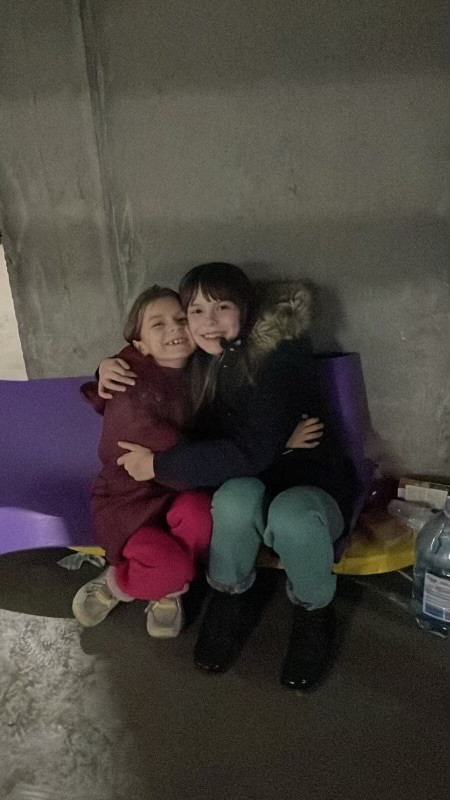A Winnipeg woman has waited since the first day of Russia’s invasion into Ukraine to see her family find safety outside the war-torn country.

On Monday, Anastasia Aslanova’s mother, sister and two nieces finally crossed into Poland, after spending nights sheltered in an underground parking lot in Kyiv.
Meanwhile, Aslanova’s brother, who had to stay behind, is helping civilians leave his native Kharkiv.
The youngest niece, frightened by the alarms, would ask her grandmother, “Can you hear how my heart is quickly beating? Can you touch it? Am I OK?” Aslanova said.
The four attempted escaping sooner but turned back to avoid getting caught in traffic and running out of gas amid the hundreds of thousands trying to flee, queuing in their cars to the western border, she said.
A horrified, shaken Aslanova searched for safe routes out of the city for the family and their four pets — all the way from Winnipeg — eventually tracking their movements using her iPhone’s locating feature once they hit the road a few days ago.
“They jumped in the car in the early, early morning as soon as it was possible, because you’re not allowed to get out of the apartment like till 7, I think, a.m.,” Aslanova told Global News on Tuesday.
“They managed to make it (out of Kyiv). It was horrible, sleepless night here.”
It’s a small sense of relief now that they’ve made it to Poland’s capital of Krakow — along with well over a million other refugees — where they’re staying with a family they’ve only just met.
“It was totally random people. They just were standing on the border, and they were asking like, ‘OK, do you need a place to stay? OK, come with us.'”

Get daily National news
But their journey is far from over. Next, they’re staying with friends in Germany before applying for visas for Aslanova’s sister and nieces, as they wait for Canada to set up its fast-tracked visa program.
- High blood pressure drug recalled over low blood pressure pill mix-up
- ‘Doesn’t make sense’: Union files labour complaint over federal 4-day in-office mandate
- Ottawa gives Canada Post a $1.01-billion loan amid ongoing financial struggles
- Ontario Liberals announce date to select new leader, kicking off race
On Thursday, Immigration Minister Sean Fraser announced Canada was creating a Canada-Ukraine Authorization for Emergency Travel for people fleeing the country, with the intention of having it ready in two weeks’ time.
The federal government plans on offering these visas, which overall demand fewer requirements, to an unlimited number of those who wish to study or work in Canada for two years — provided they can satisfy a background check and security screening that includes biometric technology they can get done at more than 30 diplomatic posts across Europe, Fraser said.
He said applications would take just weeks to process, instead of the usual year.
Aslanova is counting on a more simplified process than normal temporary resident visa applications.
“They used to request a lot of information, like you have to provide the bank statement. You have to provide the information that you have a property in Ukraine and stuff like that. Obviously, it’s not available right now. It’s just impossible,” Aslanova said.
Winnipeg immigration lawyer receiving ‘a lot of requests’
Winnipeg immigration lawyer Alastair Clarke’s office is asking for biometric exemptions in some cases, given that Ukraine’s visa application centres are closed.
“Yesterday, I spoke with a client who came to Canada as a truck driver, and his two sons are in Kyiv. They can’t come because they are going to fight, but he is very concerned about them, and so we are helping in every way we can to apply for applications or visas for any Ukrainian who qualifies,” Clarke told Global News on Tuesday.
“At this point, we are getting a lot of requests.”
Meanwhile, Aslanova and her family are holding onto hope they can spend the summer in Winnipeg to find some normalcy for the children and that the violence in Ukraine will come to an end soon — although Aslanova is convinced it will take time to rebuild everything to a livable state.
“They don’t really want to go anywhere. They want to stay there. They want to get back home as soon as possible.”
— with files from The Canadian Press












Comments